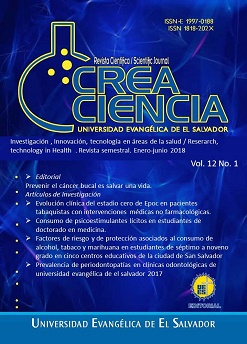Clinical evolution of epoc zero stage in smoking patients with non-pharmacological medical interventions
DOI:
https://doi.org/10.5377/creaciencia.v12i1.8057Keywords:
Zero stage of COPD, non-pharmacological treatment, breathing exercises, pulmonary rehabilitationAbstract
Smoking cigarettes in a chronic way can cause respiratory symptoms, in addition to obstructive patterns. However, the application of non-pharmacological measures or pulmonary rehabilitation,through breathing exercises and physical activity, can be applied in a curative and preventive way.
To evaluate the clinical evolution of the zero stage of COPD in tobacco patients with non-pharmacological interventions. An uncontrolled clinical trial was carried out, with a sample of 18 participants, from a population of 43.
Respiratory symptoms were evaluated; all this before and after applying non-pharmacological measures, which lasted 4 months.
Respiratory symptoms such as cough, expectoration, dyspnea and wheezing were identified, also evaluating the amount of symptoms.
The Mc Nemar Test was performed to check the hypotesis and verify if the zero stage of COPD decreases after performing non-pharmacological interventions, this test was not significant, which indicated that the proportion of patients with zero stage of COPD smoking did not decrease significantly after applying the interventions; however, the number of symptoms decreases significantly, which was confirmed by the sign test, in which the p-value was lower than 0.05 (0.028).
CONCLUSION: With the application of non- pharmacological measures, tobacco patients improve many symptoms; however, the number of patients with stage zero COPD does not decrease, so it is recommended that the interventions be extended to verify if the changes in the zero stage are significant.
Downloads
901
Downloads
Published
How to Cite
Issue
Section
License
© Crea Ciencia
Declaration of originality and assignment of rights
The article must be sent with a declaration of originality, responsibility and assignment of rights of copy of the manuscript, scanned and signed by the author or by one of the authors when the authorship is collective (designated author), stating that the text has not previously published in printed or electronic format, which will not be presented to any other media before knowing the decision of the journal Crea Ciencia and that, if accepted for publication, the authors transfer the copyrights in all forms and media known. At the end of six months of the publication, the text can be shared in another magazine citing the first version of the article published in Crea Ciencia and recording its number and volume. If the article is not published, the UEES agrees to return the rights enunciated to their authors.

Crea Ciencia articles are published in open access and licensed under a Creative Commons Attribution-NonCommercial 4.0 International License.

